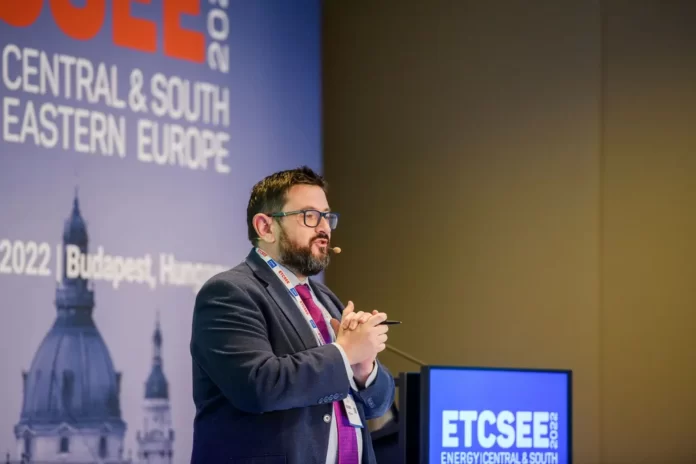“It is hard to speak about the lessons learnt from a crisis while we are still in the middle of it.” This is how Mark Copley, CEO of the European Federation of Energy Traders (EFET) defined the current, unprecedented times we are living in.
On the sidelines of ETCSEE, the 2-day conference-led event for the energy trading community that took place in Budapest on 15-16 June, CEENERGYNEWS spoke with Mark Copley about the advantages and disadvantages of the European market design, the main challenges for energy traders and how to look at the future with hope and optimism.
On the subject of opportunities, Mr Copley began: “If we look at how the power system of Ukraine has been successfully synchronised with Continental Europe, it shows that we can really do things fast when we need to and want to. So it is a good example of the fact that when we really want to achieve something, we can.”
The second aspect he underlines is the green transition, which was never as important as it is now.
“Before the war, we were decarbonising because we were rightly afraid of destroying the planet,” he points out. “Now it worries me that some people seem to be talking about the security of supply coming at the expense of decarbonisation.”
“The two go together, particularly in the long-term, with the decarbonisation of the power sector being key to securing energy supply and reducing dependence on Russian fossil fuels.”
Cooperation is also essential and Mr Copley reminds us that over the past 20 years, Europeans have built the best functional energy market in the world.
“It is kind of amazing that we got all of these countries working together to improve the security of supply,” he says. “But energy remains fundamentally political and there is always a risk that if politicians don’t like the prices, they blame the market design.”
Indeed, even the president of the European Commission, Ursula von der Leyen said that the bloc’s electricity market “does not work anymore” and a reform is needed. Responding to questions from the European Parliament at the beginning of June, she noted that the Commission had proposed a toolbox of measures to offer short-term relief without changing the structure of the market, which is still the one designed in a way that worked 20 years ago when renewables were just coming into the picture and were the most expensive sources of energy. “Today the market is completely different and renewables are the less expensive sources while gas is the most expensive one and it is the one defining the whole prices. This market system doesn’t work anymore,” she said.
“The rise of interventionism in the market is worrying,” says Mark Copley.
“Governments’ interventions can help those customers who need it most in the short-term,” he says. “But they have to be designed in a way so that they don’t drive up risks in the long run, both in the trading sector and for investments.”
“We must also recognise that global security of supply challenges won’t be effectively tackled without working together and currently, multiple national measures show we are not working together to the right extent.”
Reflecting on the words of president von der Leyen, he disagrees with her characterisation of a market which is no-longer fit-for-purpose. He stresses that ACER has just investigated this very topic and identified a well-functioning market. He also stresses that this is a point reflected in the Commission’s own REPowerEU plan.

“There is no magic bullet,” he says. “For sure it is important to make a greater use of things like Power Purchase Agreements, to better integrate and grow intraday and balancing markets and to make sure there is enough cross border capacity available, all this would help.”
“We need to make sure our single European market is truly that – and move away from a patchwork of national rules,” he goes on. He points to the benefits that the coupled Day Ahead market has delivered and its role in optimising the use of generation assets and creating a reliable price signal. He stresses the dangers of price caps distorting that process. He recognises the market is imperfect but feels that the focus should be on enhancing something developed over 20 years.
Reflecting on the role of long-term PPAs and contracts he says that anytime that we strike a long-term contract, there is a risk.
“Unless you have confidence that market conditions and market rules will remain relatively stable, it is likely to be difficult to fully develop these markets,” states Mark Copley. However, he points out that EFET is playing its part and has developed a free PPA template to reduce the costs of striking these contracts.
Especially, for Mr Copley, the biggest challenge for traders currently are low levels of liquidity, risks of further changes in Russian flows or in Europe’s response and the price volatility this leads to.
“When prices rise rapidly, the margins which traders need to post (in cash and at short notice) also increase significantly, limiting the ability to trade and further reducing liquidity. That, coupled with political uncertainties, means it’s a challenging time for EFET members.”
But overall, he says there are reasons to be cautiously positive.
“The market we have created in Europe is impressive, works well and fundamentally contributes to the security of supply and decarbonization. There are ways to improve it, but I cannot think of a better way of doing it,” he concludes. “If our long-term response to the war in Ukraine is to increase the speed and ambition of decarbonisation in Europe then we can have more secure supplies and limit the damage which climate change will cause.”



